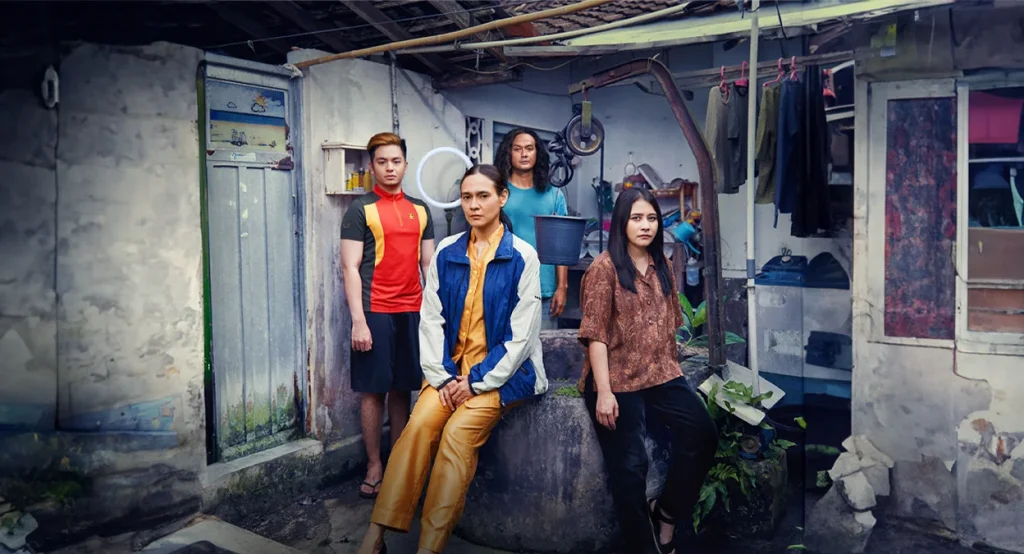
A dedicated high school teacher in Yogyakarta witnesses the implosion of her precarious family unit after they are subjected to a ruinous cyberbullying campaign following her fateful encounter with a fellow citizen in public. Whereas stories of online mobs and their targets are often recounted by the morally aggrieved, here is a dramatized version of a typical witch-hunt whose sympathies lie squarely with the witch and her coven. Rather than craft his serious trial-by-social-media story as heavy drama, writer-director Wregas Bhanuteja instead stages it with a light touch without sacrificing the gravity of this theme or his characters’ dilemmas. What unfolds is a commanding film that works as both as a crowd-pleaser and an incisive commentary on how today’s digital technologies are nothing if not a form of weaponized surveillance to discipline human behaviour to excess. While the film’s humble Indonesian title Budi Pekerti means ‘Good Manners’, its international one is the wordier Andragogy, a Greek-derived academic term that means the science of educating adults critically. Evoking the lack of common sense exhibited by many grownups in Bhanuteja’s second feature, the English title is an apparent nod to the adage that quality learning is a lifelong commitment beyond childhood.
Prani (Sha Ine Febriyanti) is a tireless mother of two young adult children but also caregiver to her bipolar husband (Dwi Sasono), whose condition has driven their close-knit household into debt. To relieve their financial burdens, she angles for a promotion to become her high school’s Vice Principal. But for now, she is its resident counseling teacher renowned for her creative punishments in which she tasks errant students with unorthodox activities called ‘reflections’ to make them consider their actions critically. While at a market one day, she calls out a queue jumper and a hostile misunderstanding develops. Unknown to Prani, the squabble is recorded, uploaded and goes viral when a rebellious student recognizes her and topples the first domino in a spectacular chain reaction that causes multiple fires to erupt beyond the first spark. At every turn, earnest attempts to douse the flames result in bigger and more menacing blazes so that Prani must always defend her conduct beyond the first incident. Soon, one of her past ‘reflections’ in which she crossed a line is uncovered and used to smear her as a child abuser. Neither are Prani’s influencer son and daughter (Angga Yunanda and Prilly Latuconsina) spared, for when they intervene, they too are left scarred and weathered.
The multi-headed beast that everyone but Prani fears and is eager to appease is the cult of public opinion. In other words, this is a self-appointed jury of trolls comprising individuals but who mobilize by groupthink. They are easily provoked, vindictive and quite unpredictable. Crucially, the virtual era has amplified their power with speed and anonymity. What has not changed is their unthinking regard for perception over reality. In various media interviews, Bhanuteja has explained that the inspiration for his film was the volume of online harassment that ensued from viral videos, where victims were in fact innocent. It is also revealing that although Prani’s road to hell begins with good intentions, not even her reasoned and rational appeals do her any favours. In real time, we see her family’s predicament play out alongside the more disingenuous narratives faked for robotic embrace. Bhanuteja has said he hopes his film—his ‘reflection’ assignment for us—will persuade audiences to consider how they behave online. In tandem then, its subtlest criticism is reserved for the vacuity of content producers and their consumers. In the film’s opening scene, Prani’s son is shown on the beach making a sponsored video for sunscreen by playing an ostrich with his head in the sand.
The cinemas of Southeast Asia, let alone films from Indonesia, have never figured in popular imaginations of Asian cinema. Yet, contemporary Indonesian cinema has been on a quiet ascendancy for the past two decades, where creative industries are answering the call for quality domestic products, which in turn are attracting new audiences globally. This archipelago nation straddling the Equator is the world’s fourth most populous country, while also being the most ethnically and linguistically diverse in the region. Since 2003, TIFF’s selection of Indonesian productions has been tepid, averaging one title every few years until 2015, when the frequency improved slightly and titles started appearing in its competitive Platform section. Most of Indonesia’s new generation of filmmakers have since been introduced, with their content divided between popular genre flicks and arty films. Andragogy’s setting of Yogyakarta is located in central Java, the world’s most populous island where over half the country lives, and with dialogue split evenly between Indonesian and Javanese. At the 43rd annual Indonesian Film Festival in November 2023, Bhanuteja’s film scored a record 17 nominations and won two top prizes: Best Actress for Febriyanti and Best Supporting Actress for Latuconsina.
Brandon Wee